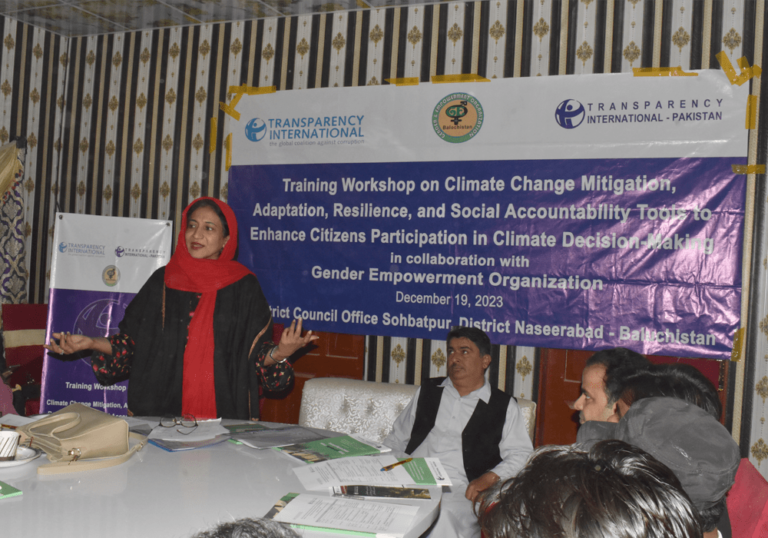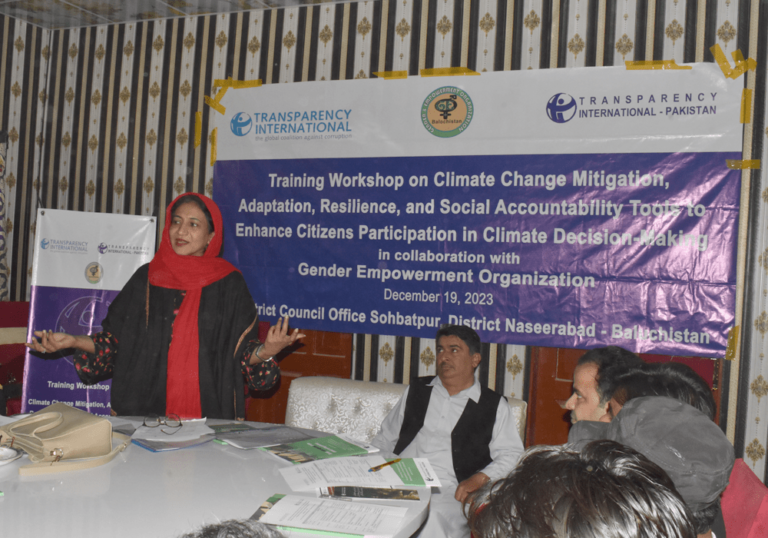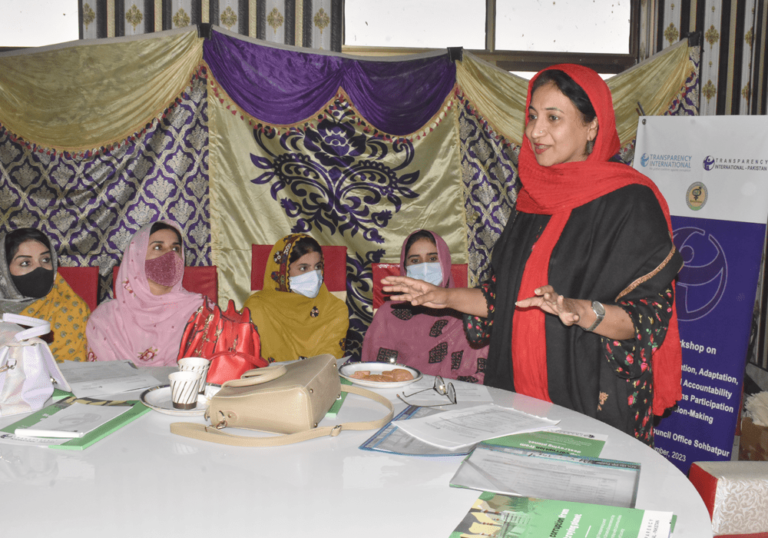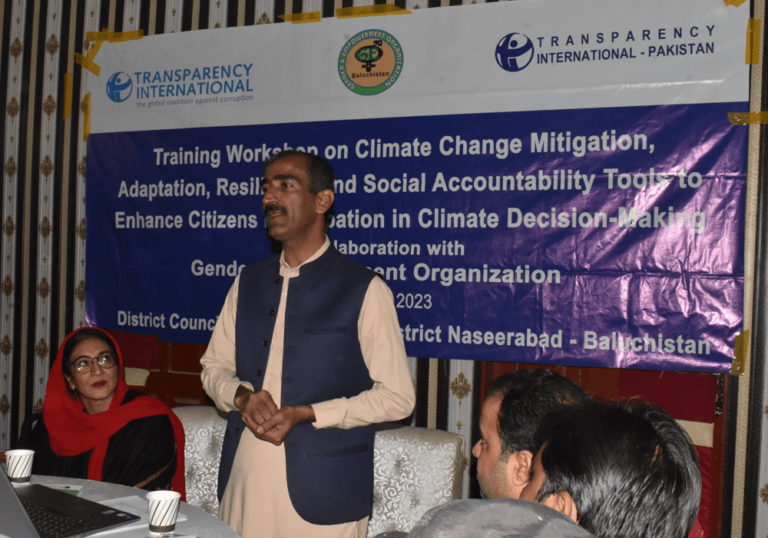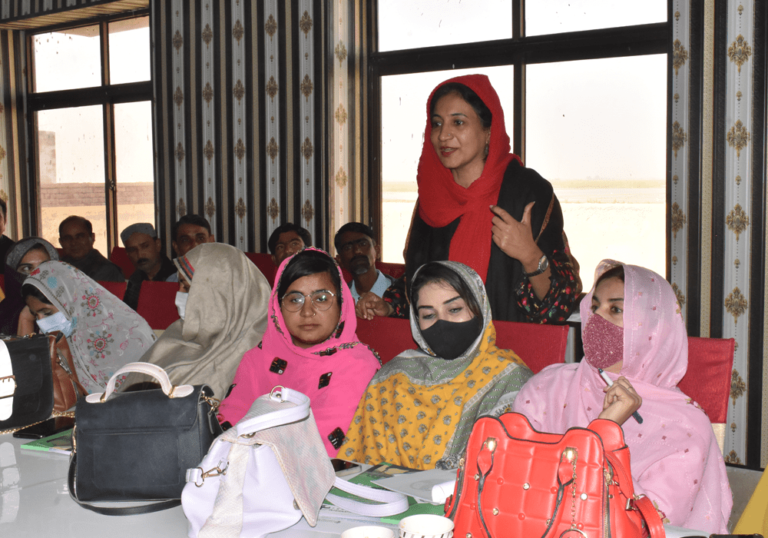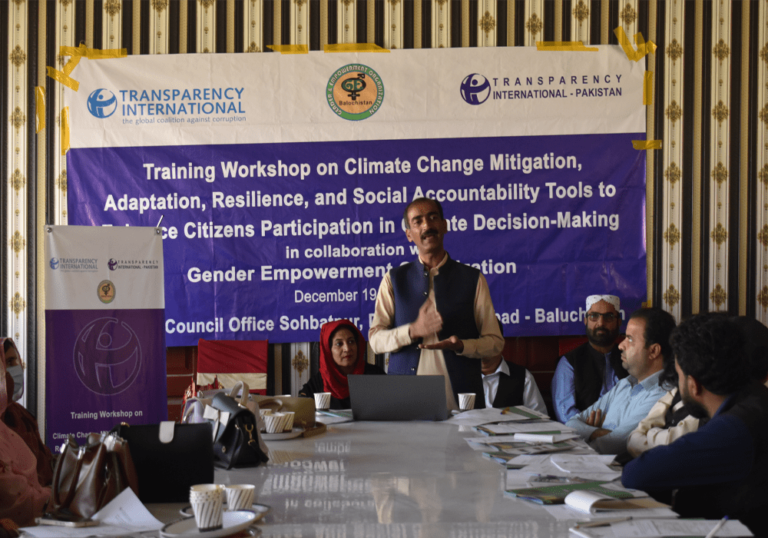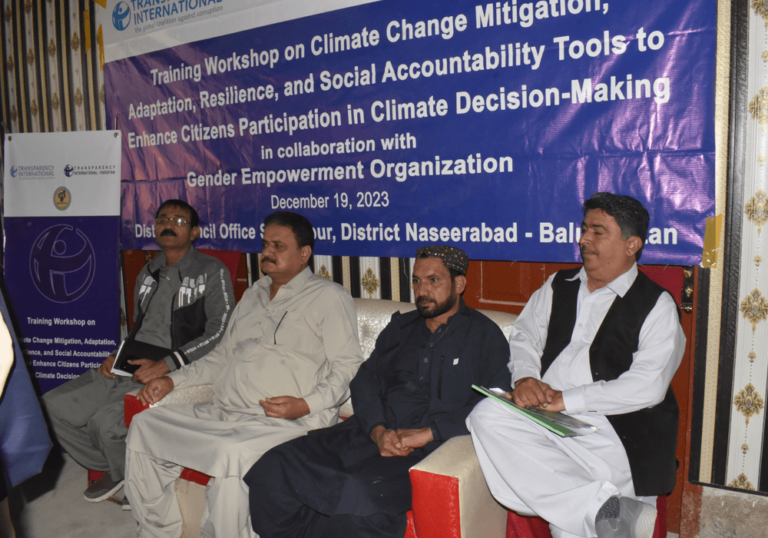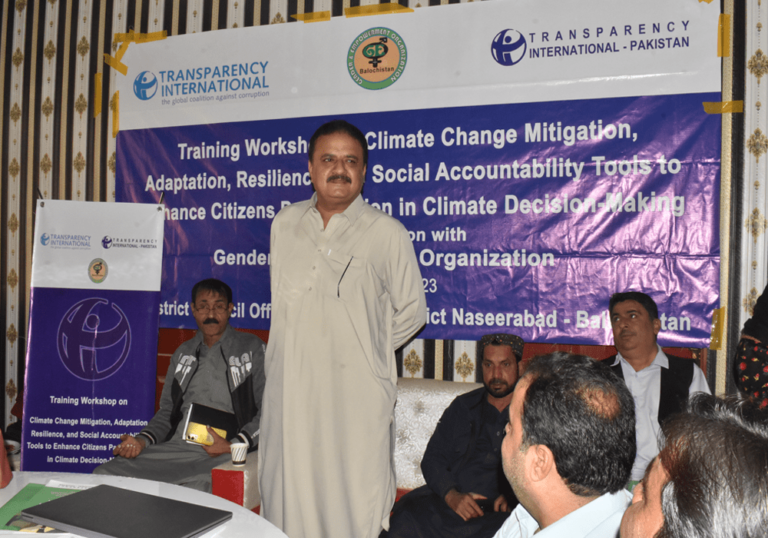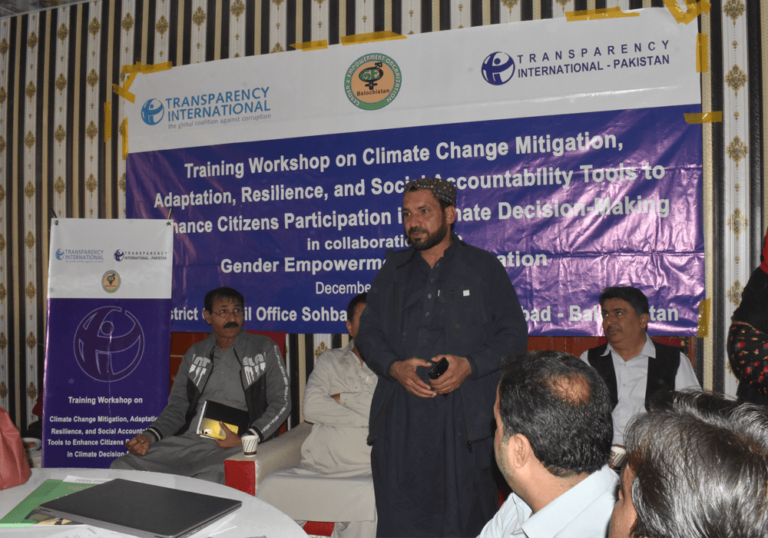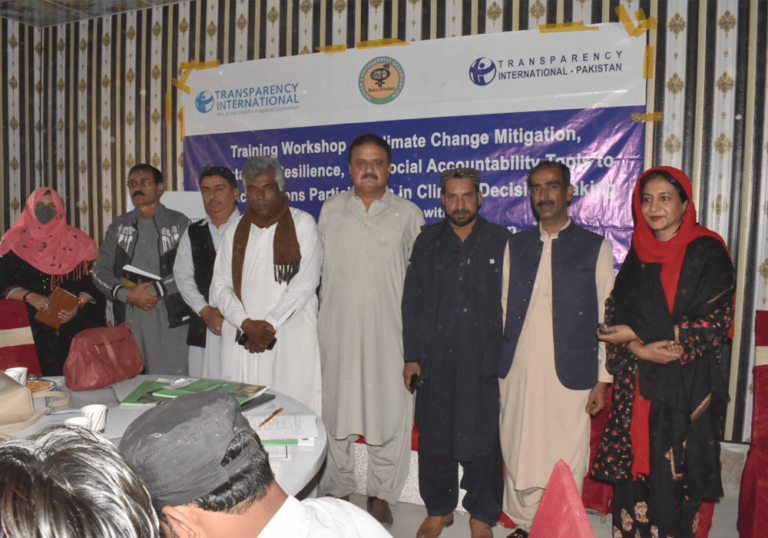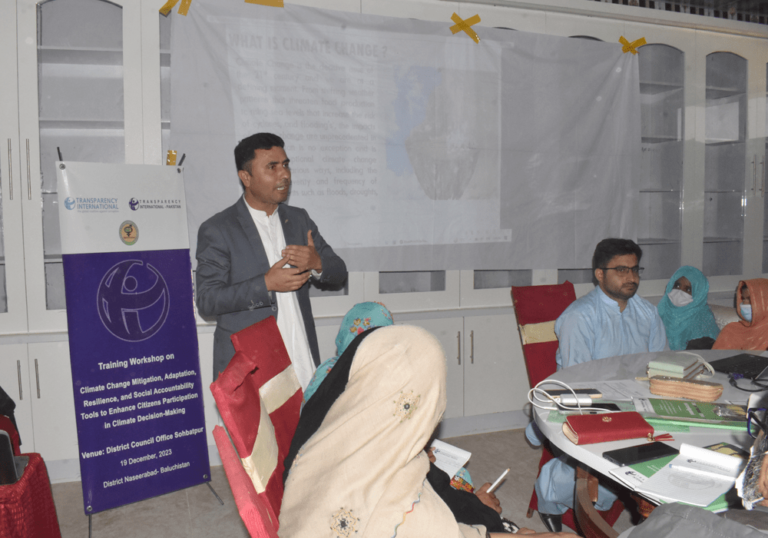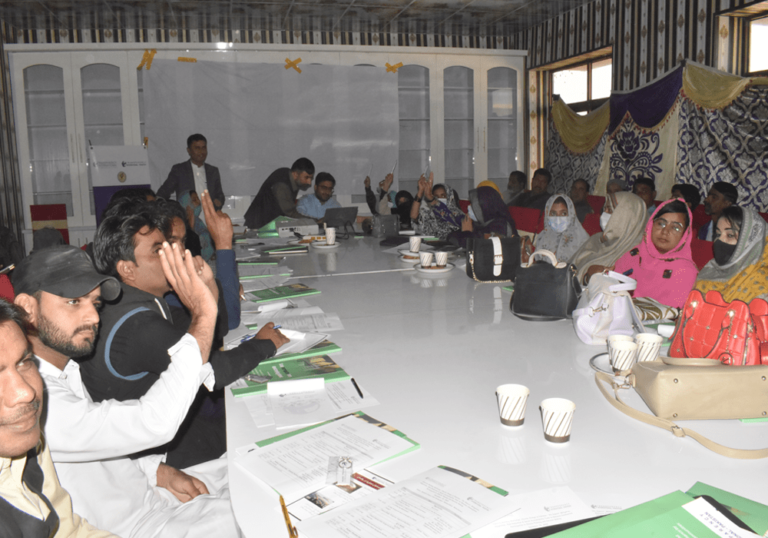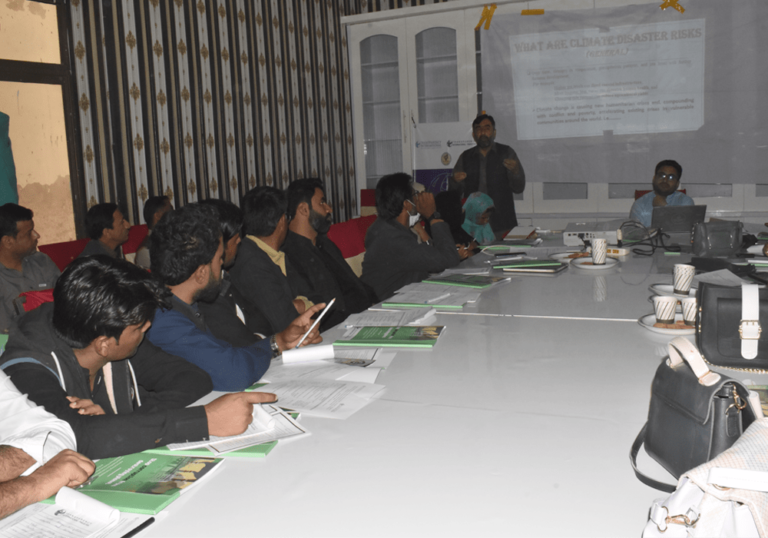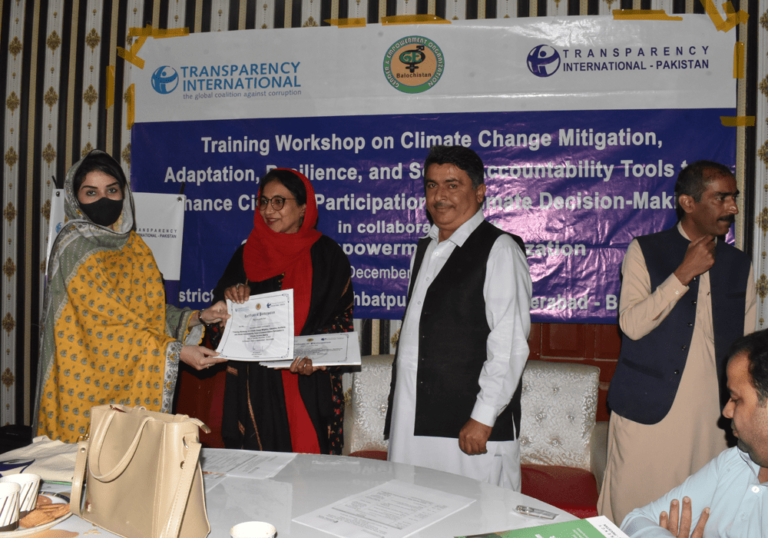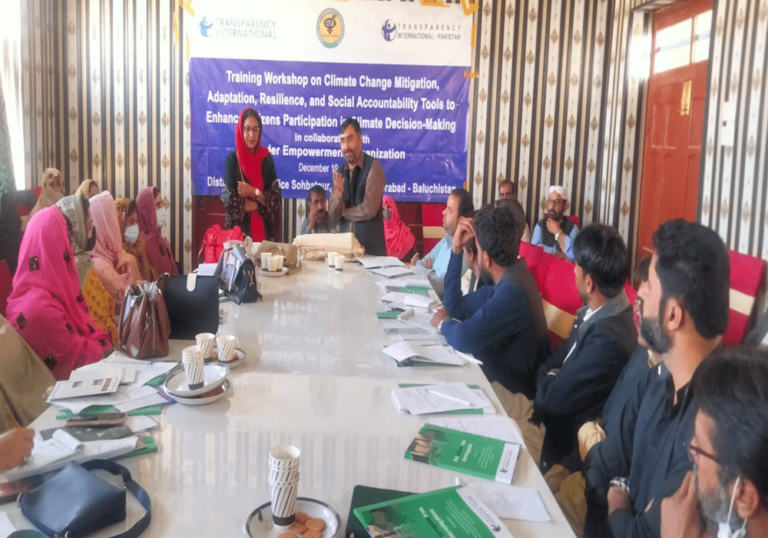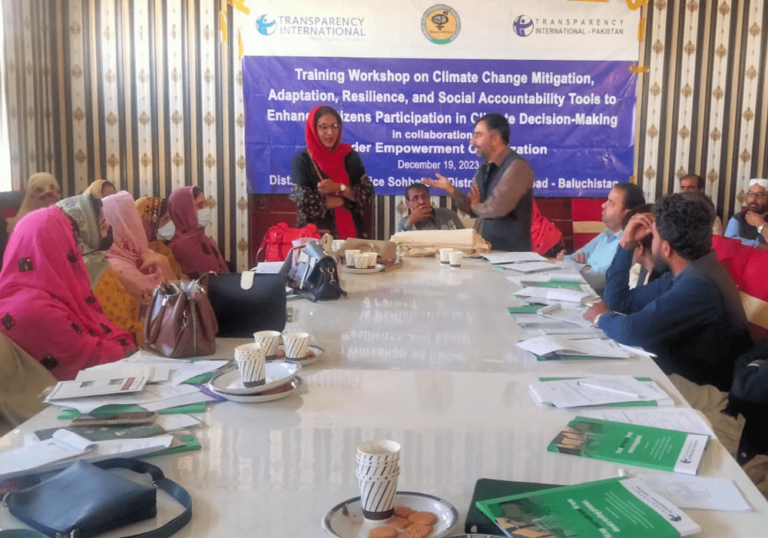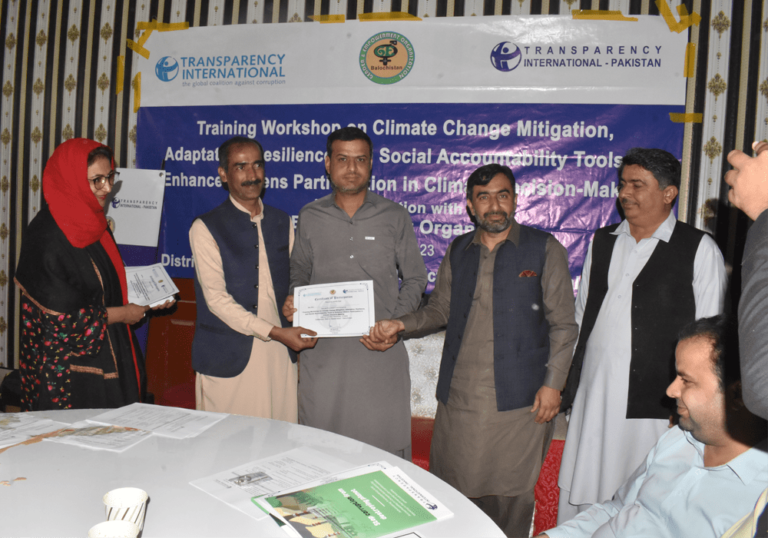- Home
- Training Workshop on Climate Change Mitigation, Adaptation, Resilience, and Social Accountability Tools to Enhance Citizens Participation in Climate, Decision-Making District Naseerabad Balochistan
Training Workshop on Climate Change Mitigation, Adaptation, Resilience, and Social Accountability Tools to Enhance Citizens Participation in Climate, Decision-Making District Naseerabad Balochistan
Training Workshop on Climate Change Mitigation, Adaptation, Resilience, and Social Accountability Tools to Enhance Citizens Participation in Climate Decision-Making
Venue: UC- Sohbatpur, District Naseerabad, Balochistan
Date: 19th December 2023
Transparency International Pakistan organized Training Workshop on Climate Change Mitigation, Adaptation, Resilience, and Social Accountability Tools to Enhance Citizens Participation in Climate Decision-Making in UC- Sohbatpur, District Naseerabad, Balochistan on 19th December 2023.
Transparency International Pakistan organized Training Workshop on Climate Change Mitigation, Adaptation, Resilience, and Social Accountability Tools to Enhance Citizens Participation in Climate Decision-Making in Sohbatpur, District Naseerabad, Balochistan on 19th December 2023.. The workshop was attended by Local Community Members, Youth, Civil Society Representatives, Representatives of District Social Welfare, Education and Health Departments, Climate Change Experts and Journalists from District Press Club UC-Sohbatpur.
The main objective of the training workshop was to educate the communities on Climate Change Mitigation, Adaptation, Resilience, and Social Accountability Tools to Enhance Citizens Participation in Climate Decision-Making, and empower them with the skills to identify and report environmental corruption.
The event started with the recitation of the Holy Quran and a round of introduction was held after which Ms. Nasreen Memon, Project Coordinator Transparency International Pakistan, welcomed participants and gave an overview of TI Pakistan’s Climate Governance and Integrity Programme. She emphasized that to effectively address climate change in Pakistan, we must also role of corruption in exacerbating the effects of climate change and the importance of community inclusion in climate action. She informed the participants that as Balochistan prepares to develop its provincial climate policy, it is imperative that the policy outlines how community engagement and inclusion will be ensured. In this regard, TI Pakistan has given draft proposal to the government of Balochistan comprising of seven pillars of integrity and inclusion to be incorporated in the draft policy. These seven pillars are: Climate Finance Dashboard, Compliance with Procurement Rules, Social Accountability, Whistleblower protection, Prevention of Conflict of Interest, Community-led Monitoring, Annual Social Audits.
Afterwards, Mr. Abdul Salam, Executive Director Gender and Empowerment (GEO) Organization provided a detailed overview of the district vulnerability assessment of Naseerabad and different types of climate effects on the community for general awareness. He highlighted that climate change pose serious threats to Pakistan, especially Balochistan— ranging from intensified weather, heatwaves, altered rainfall, sea-level rise, and coastal erosion. He emphasized that people need eco-friendly measures at the local level such as reduced fossil fuel dependence, extensive plantation, swift climate policy, resilient infrastructure, and green investment projects.
He also highlighted that the women are affected disproportionately during climate emergencies and have faced issues such as sexual harassment, relief camp sanitation, medical assistance gaps, limited lady doctor access, social treatment restrictions, malnutrition, domestic violence, reduced education, early marriages, psychological distress, and water-fetching journeys.
Moving on, the next speaker, Mr. Abdul Baqi, Climate Change Trainer gave presentation on the topic “Climate Change: Mitigation, Adaptation & Resilience”. He highlighted three key approaches to address climate change. First, mitigation aims to tackle the root causes by reducing greenhouse gas emissions. Second, adaptation focuses on adjusting with the climate changes that are already happening. Lastly, resilience involves proactively building the capacity to cope with and recover from climate change impacts. Stressing the importance of a comprehensive strategy, he recommended combining mitigation, adaptation, and resilience strategies to effectively tackle the diverse challenges presented by climate change. He also discussed in detail mitigation and adaptation strategies which communities can employ and adopts at their individual and community level.
Next speaker was Mr. Aajaz Khoso, Youth Development Consultant. He facilitated an interactive discussion on the topic “Climate Disasters Risk: Mitigation and Risk Reduction”. In addition to engaging participants with basic questions about climate problems and ways to mitigate and better prepared to deal with climate emergency situation such as floods, Mr. Khoso emphasized key terms in disaster management, such as hazard, risk, vulnerability, capacity, response, relief, rehabilitation, reconstruction, development, mitigation, preparedness, and prevention.
He shared valuable insights on addressing the root causes of climate issues to minimize their impact. Furthermore, he underscored the importance of adaptation, involving changes in both human and natural systems to cope with future climate change effects. Additionally, he stressed the significance of the District Disaster Management Committee and cooperation among institutions during disasters, providing useful tips for managing disaster risks effectively.
Afterwards, Ms. Nasreen Memon Project Coordinator, Transparency International Pakistan conducted a session on Community Participation and Social Accountability for Climate Planning and Decision Making. She emphasized the critical role of Community Participation in ensuring that climate action is transparent. She spoke in detail on community-led monitoring and community-led social audits of climate action. This requires involvement of communities in the implementation of the climate related projects from project conception to project closeout. She also spoke in detail about Balochistan Right to Information Act 2021, passed on February 1, 2021. Expressing concern about the delayed establishment of the Information Commission, a breach of Section 18(1) mandating appointments within 180 days. She urged citizens to use RTI provisions to hold climate action accountable. She guided the participants on how to draft effective RTI requests for information from climate departments.
Moving on, Community Resilience Building exercise was also conducted during the session. The participants were divided into different groups and were asked to identify the vulnerabilities in three key areas infrastructure, environment and social. Given these three areas, they were also asked to prioritize the risk of different hazards such as heatwaves, floods, and droughts. The participants highlighted different risks in Naseerabad and also suggested some measures to mitigate these risks.
Groups 1 & 2 highlighted unplanned constructions and inefficient urban planning. Groups 3 & 4 focused on environmental issues like floods and deforestation. Societal concerns, such as a lack of climate awareness, were underscored by Groups 5 & 6, stressing the urgency for behavioral shifts.
A common thread across all groups was the call for improved coordination among departments, enhanced policy measures, and climate-smart urban planning to effectively address climate challenges and foster community resilience.Top of Form
As the workshop concluded, participants thanked TI Pakistan for the foundational capacity-building session. They appreciated the chance to gain skills and knowledge to address climate change in their communities. Participants pledged and committed to applying what they learned about mitigating climate impacts and contribute to local decision-making processes.


